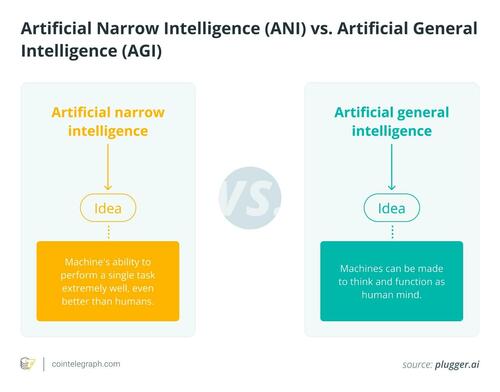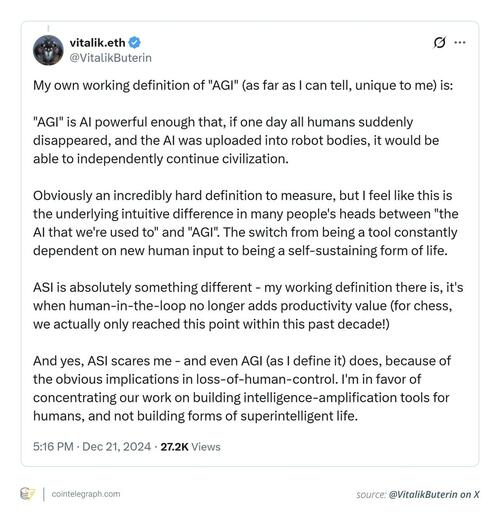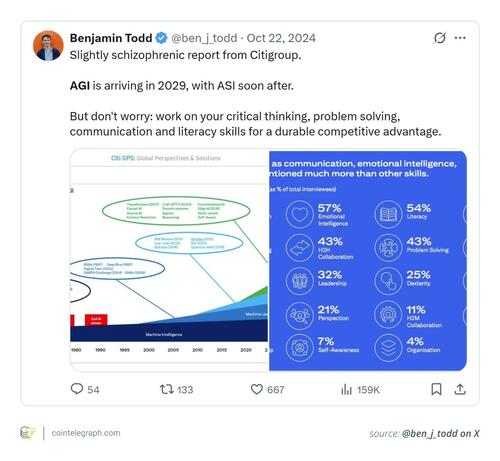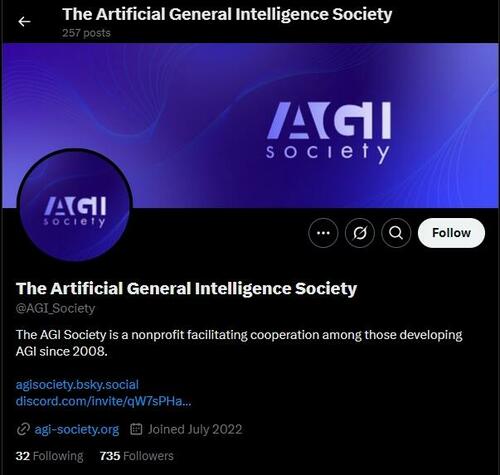


Authored by Jules Winnfield via CoinTelegraph.com,
When the lines blur between man and machine, you’re looking at artificial general intelligence (AGI). Unlike its counterpart, artificial narrow intelligence (ANI), which is the use of AI for solving individual problem statements, AGI represents artificial intelligence that can understand, learn and apply knowledge in a way that is indistinguishable from human cognition.
AGI is still theoretical, but the prospect of artificial intelligence being able to holistically replace human input and judgment has naturally attracted plenty of interest, with researchers, technologists and academics alike seeking to bring the concept of AGI to reality.
Yet another strand of prevailing research seeks to explore the feasibility and implications of AGI vs. ANI in a world increasingly shaped by AI capabilities.
Indeed, while ANI has already transformed various industries, AGI’s potential goes far beyond. Imagine a world where machines can not only assist humans in their tasks but also proactively understand the drivers behind specific tasks, predict outcomes, and autonomously create innovative solutions to achieve optimal results. This paradigm shift could revolutionize healthcare, education, transportation and countless other fields.
Unlike ANI, AGI is not confined to pre-programmed tasks or predefined responses within a limited domain. Instead, it has the potential to generate and apply knowledge across various contexts.
Imagine a self-driving car powered by AGI. It can collect a passenger from a train station but also personalize the journey with custom recommendations for pit stops, sightseeing avenues or navigating unfamiliar roads to arrive at the desired destination. And because it’s a machine, AGI would not experience fatigue and would continue learning and improving at exponential speeds.
Here’s a definition of AGI by Vitalik Buterin, who highlights the sheer potential of AGI:
The example highlights some interesting features of AGI, which include:
Did you know? Blockchain timestamps could serve as a legal memory for AGI systems, allowing future audits to determine exactly what an AGI knew — and when.
AGI is currently the science-fiction version of AI. However, while still theoretical, the sheer potential of the concept makes AGI the science fiction equivalent of artificial intelligence.
While existing models, such as ChatGPT, are constantly evolving and improving with each day, the journey to bringing AGI to life involves overcoming significant technical challenges, such as:
Despite advancements, creating AGI that can truly think like a human remains an elusive goal.
Did you know? DeepMind warns that not all AI risks come from the machines themselves — some start with humans misusing them. In its paper titled ‘An Approach to Technical AGI Safety and Security’, DeepMind identifies four key threats: misuse (bad actors using AI for harm), misalignment (AI knowingly going against its developer’s intent), mistakes (AI causes harm without realizing it), and structural risks (failures that emerge from complex interactions between people, organizations, or systems).
The question of whether AGI can think like a human delves into the very core of human cognition. Human thinking is characterized by consciousness, emotional depth, creativity and subjectivity. While AGI can simulate certain aspects of human thought, replicating the full spectrum of human cognition is a formidable challenge.
Several dimensions of human cognition are particularly difficult to emulate:
The litmus test for AGI lies in its ability to holistically replicate a human experience. When realized, the potential benefits are enormous and stretch across various industries, spawning various aspects of daily life.
Despite its limitations, AGI is increasingly viewed as a force for good across a range of industries, including:
Additionally, AGI’s potential extends to areas such as transportation, communication and entertainment, offering new frontiers for innovation.
Did you know? Some futurists believe AGI systems could eventually negotiate with each other autonomously using blockchain-based smart contracts — forming agreements, trading data or even co-developing solutions without human intervention.
The rise of AGI raises significant ethical and societal questions.
While powerful, AGI requires careful consideration for safe usage, which has prompted the creation of nonprofit societies, such as the AGI Society, as shown in the image below.
Fundamentally, it is crucial to address concerns such as:
The integration of AGI into society requires a thoughtful approach to its governance, ensuring that it serves the common good and respects social values.
AGI could create computers as smart as humans, revolutionizing fields like cryptocurrency trading or market analysis. But AGI needs trust and fairness to work for everyone. Blockchain, the tech behind Bitcoin and Ethereum, offers a secure, transparent way to make this happen.
Here’s how blockchain can supercharge AGI with crypto-inspired solutions:
However, ongoing challenges such as blockchain’s slow speed, delays in crypto transactions and limited storage capacity could make it hard for AGI to process data quickly or handle large datasets.
To make blockchain AGI-ready, researchers are already exploring:
Artificial general intelligence represents the pinnacle of AI development, promising capabilities that rival human intellect.
While AGI can simulate aspects of human thinking, achieving true human-like cognition remains a distant goal. Consciousness, emotional depth and creativity are intrinsic to human experience and pose significant challenges for AGI.
Nevertheless, the pursuit of AGI continues to drive innovation and reshape our understanding of intelligence. As we advance toward this frontier, it is imperative to navigate ethical considerations and societal impacts to responsibly harness AGI’s potential.
Ongoing research, identifying practical opportunities and technical requirements, and initiating dialogue across society are all essential steps to address the challenges and opportunities posed by AGI.
The future of AGI holds promise, but it requires a balanced approach to ensure that its eventual integration into society enhances human well-being and respects ethical standards.




